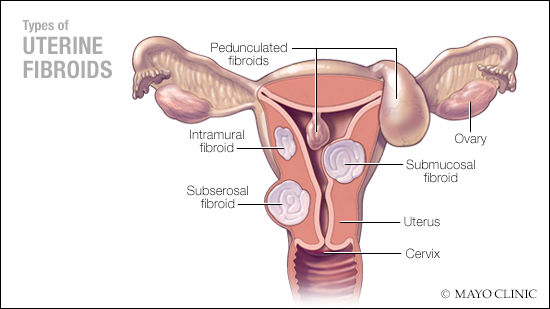
Uterine fibroids, noncancerous tumors of the uterus, affect about 70% of white women and up to 90% of Black women according to the National Institutes of Health (NIH). Fibroid symptoms may include heavy menstrual bleeding, pelvic pain, bowel and bladder problems, and sometimes infertility and miscarriage. For women of African descent, fibroids may develop at an earlier age and be more frequent and severe. Many women, particularly Black women, are likely to undergo hysterectomy to alleviate significant health issues.

“Uterine fibroids are so common that women tend to normalize the pain,” says Ebbie Stewart, M.D., a Mayo Clinic gynecologist and researcher. “Further study is needed to fully understand the health disparities in diagnosis and treatment of fibroids. Improving care for all women and especially Black women is a key research goal.”
The traditional approach to treating fibroids has been observation to avoid unnecessary intervention and hysterectomy for more serious cases. Understanding the barriers to wider use of conservative nonsurgical treatment options is needed.
Over many years, Dr. Stewart and collaborators have published extensive research on facets of uterine fibroids that disproportionately affect the African American population, calling it a public health issue in a 2013 study published in the American Journal of Obstetrics and Gynecology. A 2021 study in the Journal of Racial Ethnic Health Disparities provides insight into the ethnoracial factors and cultural barriers that women of color experience in the management and treatment of uterine fibroids.
New center to address a public health issue
To establish a specialized center for research on health disparities around uterine fibroids, Mayo Clinic was awarded a $7.5 million grant from the Eunice Kennedy Shriver National Institute of Child Health and Human Development, part of the NIH.
The new center at Mayo, named the Collaboration for Equity in Uterine Leiomyomas Center, will advance efforts to diagnose patients with fibroids earlier, identify barriers that make it difficult for patients to receive care, and increase communication between patients and healthcare providers, through the lens of health disparities. Dr. Stewart will lead the center’s effort and collaborate with researchers at the Fibroid Foundation; the University of Florida College of Medicine, Jacksonville; and the University of Mississippi Medical Center.
Community outreach is an important part of the project, including dissemination of material to women who suffer from fibroids and to healthcare providers, family members and policy makers. The collaboration involves researchers who participated in the COMPARE-UF fibroid registry project, a multicenter study to evaluate the effectiveness of different treatment strategies for uterine fibroids. Dr. Stewart was clinical leader of the study, first published in 2018 in the American Journal of Obstetrics and Gynecology.
Researchers will also explore strategies to see if electronic health records can help women with fibroids receive more timely care. The data will be used to develop risk prediction models to aid in screening for fibroids and in spotting signs of progression to hysterectomy following conservative therapy, and to improve diagnosis.
“We believe the findings of our research will impact every facet of uterine fibroid care and improve the experience for all women,” says Dr. Stewart.
Mayo Clinic is one of two institutions to receive NIH funding to establish specialized centers for research on health disparities. The University of Michigan will lead the other center.
NIH grant RFA-HD-24-005: Specialized Centers for Research on Health Disparities in Uterine Leiomyoma.
Additional Resources:
